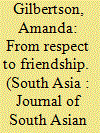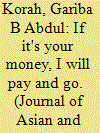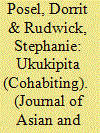| Srl | Item |
| 1 |
ID:
131901


|
|
|
|
|
| Publication |
2014.
|
| Summary/Abstract |
Drawing on twelve months of ethnographic fieldwork in suburban middle-class Hyderabad, India, this paper explores gender equality in the context of rising companionate marriage ideals. Informants described a shift in marriage from a hierarchical relationship of respect to a more equal relationship of friendship, expressed concern about marital disharmony caused by 'ego problems' and insisted that women's 'adjustment' was essential for a successful marriage. Complex conjugal power negotiation reflects class distinction projects as informants sought to claim the 'moral middle' between lower and upper classes by presenting themselves as progressive and open-minded, but also respectably Indian.
|
|
|
|
|
|
|
|
|
|
|
|
|
|
|
|
| 2 |
ID:
132313


|
|
|
|
|
| Publication |
2014.
|
| Summary/Abstract |
Like many ethnic groups in sub-Saharan Africa, the Dagaaba of northwest (now Upper West region) Ghana have regarded, and for the most part, continue to regard the payment of the brideprice as the cornerstone upon which marriage is built - without it a marriage contract is not considered legal. Since the 1980s, however, the significance or essence of the payment has been contested and challenged by many Dagaaba. While some (young men) argue for a reform of the payment, others (young women) argue that the practice should be abolished altogether. Yet a third group (mostly elders) believes that brideprice payment is a "tradition" passed down over generations that should be maintained. This article examines the origins and historical significance of brideprice payments, and how views about these payments have changed over time among the Dagaaba - from those born near the close of the last century, to those of marriageable age now. The goal of this examination is to contribute to the ongoing discussion among African scholars and governments on the importance of maintaining certain aspects of their cultural heritage.
|
|
|
|
|
|
|
|
|
|
|
|
|
|
|
|
| 3 |
ID:
132310


|
|
|
|
|
| Publication |
2014.
|
| Summary/Abstract |
In South Africa non-marital cohabitation rates among Africans remain low, and particularly in the context of very low marriage rates. Through qualitative interviews with urban isiZulu-speakers we explore attitudes towards ukukipita (cohabiting) in contemporary Zulu society. These in-depth interviews capture the meanings associated with non-marital cohabitation and they provide insights into why cohabitation is widely viewed as unacceptable in Zulu society unless the man has initiated ilobolo (bridewealth) negotiations and concrete marriage plans are in place. Cohabitation without ilobolo payment is widely interpreted as akin to behaving disrespectfully towards Zulu culture and tradition, the immediate family and the Zulu community more broadly.
|
|
|
|
|
|
|
|
|
|
|
|
|
|
|
|